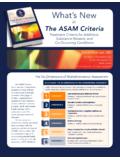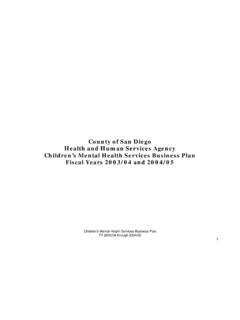Transcription of Schizophrenia & Substance Use
1 Schizophrenia & Substance Useinformation for consumersAt some point in their lives, many people with Schizophrenia abuse substances (street drugs, over-the-counter drugs and /or alcohol). Recent studies have shown that about half of all people with Schizophrenia also have problems with drugs and alcohol, and up to 90% of people with Schizophrenia are addicted to nicotine. The combination of mental illness and Substance use disorder is often called concurrent disorders or co-occurring disorders , and in the United States, dual diagnosis . People living with Schizophrenia and other psychotic disorders tend to use substances that are affordable, easily accessible and readily available, such as alcohol, cannabis and nicotine. Prescription drugs like tranquilizers and sleep medication may also be misused. iEven though it is so common, many people with Schizophrenia and Substance abuse issues have fallen through the cracks of the health care system.
2 Mental health services may refuse treatment and services to a person with an active drug or alcohol addiction, and addiction professionals often believe that a person cannot recover from problem Substance use until their mental disorder is This has resulted in people with concurrent Schizophrenia and Substance use problems being bounced back and forth between mental health and addictions services, sometimes being refused treatment by either system. There is, however, a growing recognition among professionals and health care organizations of the problem of concurrent disorders , and more and more concurrent disorders services are becoming available. cont.>..many people with Schizophrenia and Substance abuse issues have fallen through the cracks of the health care do people with Schizophrenia use drugs and alcohol? How can using substances affect you if you re living with Schizophrenia ?
3 What kind of treatment is helpful?Can people recover?What can you do?Where can you fi nd help? Schizophrenia and Substance Usebstance UseAt fi rst, the effects of drugs and alcohol may provide relief from or cover up some of the symptoms of Schizophrenia and other psychotic disorders . But symptoms can also get worse when people are active users, and withdrawal from the substances almost always makes symptoms to people who do not use substances, people with Schizophrenia who take non-prescribed drugs and/or abuse alcohol generally: v Are more likely to end up in hospital or in jail Are more likely to experience relapses of their Substance use and mental health disorder Are less likely to stick with and be successful in following treatment/ self-management plans Have greater problems with their physical health Have more diffi culties with fi nances, housing and personal relationships Have increased thoughts of suicide Are more likely to become aggressive, hostile and volatileHow can using substances affect you if you re living with Schizophrenia ?
4 Schizophrenia and Substance use interact to make each condition worse, with serious and negative effects on many areas of people s often wonder: Which came fi rst: the mental health problem or the Substance use problem? This is a hard question to answer. Often it is more useful to think of them as independent problems that interact with each Both should be seen as primary disorders and responded to and Substance use interact to make each condition worse, with serious and negative effects on many areas of people s lives, including work, relationships, health and safety. ivResearch has shown that people with Schizophrenia and other mental disorders often use drugs and alcohol for the same reasons as everyone else to feel better or different, to relax and have fun, and to be part of a group. Other reasons for drug use include curiosity or experimentation, to relieve stress, to overcome boredom, and to cope with symptoms of mental illness.
5 Why do people with Schizophrenia use drugs and alcohol?2 Recovery from Schizophrenia and other psychotic disorders is more challenging for people who also abuse substances than for those who don t. The recovery process can be prolonged, and relapse is more likely due to the use of substances. A relapse occurs when a person in recovery re-experiences problems or symptoms associated with his or her disorders . With Substance use disorders , a relapse means a return to problem Substance use after a period of abstinence or controlled use. A relapse of a mental illness like Schizophrenia means a return or fl are-up of the symptoms of psychosis. A relapse of one disorder can sometimes trigger relapse with the recovery is possible! New research is showing that, with access to integrated treatment and psychological services, along with community supports and services, most people with Schizophrenia and Substance abuse can and do recover over time.
6 Recovery is defi ned differently for each individual, but is generally thought to include: hopefulness, renewed meaning and purpose, managing the symptoms of Schizophrenia , remission from Substance abuse, living independently, having a job, having friends and social support, and quality of life. People move toward recovery on different paths, so the supports that are needed are different for each individual. Most consumers report that recovery involves reaching their personal goals in life. People need a range of options to promote and sustain recovery. These include self-help groups, access to integrated treatment of mental health and Substance use problems, and vocational and housing support. viCan people recover?54 Because people with Schizophrenia and Substance use issues have a complex set of interlinked problems and treatment needs, an approach that combines both mental health and addiction services in one program is the most features of integrated treatment programs include.
7 Assertive outreach to engage people who are often reluctant to come forward for help, support and treatment Motivational interviewing-based approaches to therapy which help people progress toward goals they defi ne for themselves A focus on a range of areas that go beyond eliminating symptoms of Schizophrenia and Substance use, including social, work and housing support A long-term perspective based upon improving people s quality of life and a belief in the possibility of recovery A growing body of evidence shows that when people receive integrated treatment for Schizophrenia and Substance abuse, they are more likely to remain engaged in treatment, and their Substance abuse and Schizophrenia symptoms can improve signifi cantly as they progress in their kind of treatment is helpful?ul?..an approach that combines both mental health and addiction services in one program is the most can you fi nd help?
8 Your local mental health centre Your local addictions treatment facility Your local Schizophrenia Society Chapter CMHA branches across Canada For a more complete listing of resources, please refer to the SSC website at Green, A. & Sherwood Brown, E. Comorbid Schizophrenia and Substance Abuse. J Clin Psychiatry (67(9) 2006ii BC Partners for Mental health and Addictions Information. Concurrent disorders : Addictions and Mental disorders . 2006 Concurrent Substance use and Mental Health disorders : An Information Guide, CAMH, 2004iv Mental Illness Fellowship of Australia: Understanding dual diagnosis: Mental Illness and Substance usev Concurrent disorders : A Resource for Families. Centre for Addiction and Mental Health, Toronto. 2006. pg. 15vi Drake, R. Ten-year recovery outcomes for clients with co-occurring Schizophrenia and Substance Use disorders .)
9 Schizophrenia Bulletin, July 2006 Most consumers report that recovery involves reaching their personal goals in can you do? Find out as much as you can about Schizophrenia , Substance use and recovery. Knowledge is power and gives you a much better chance of developing good coping strategies. Get the help you need. There are caring service providers, self-help groups (such as Double-Trouble, AA, NA) and other helpful programs available for people who are struggling with Schizophrenia and Substance use problems. Talk to family members and friends about developing an action plan to help prevent relapse of symptoms of Substance use and psychosis, and discuss what to do in case of relapse. Know what to expect of the mental health system and be prepared to be assertive in seeking care, support and treatment. Please see the SSC website for further ideas and information is power and gives you a much better chance of developing good coping strategies.
10 NotesNotes Our MissionTo improve the quality of life of those affected by Schizophrenia and psychosis through education, support programs, public policy and research.







